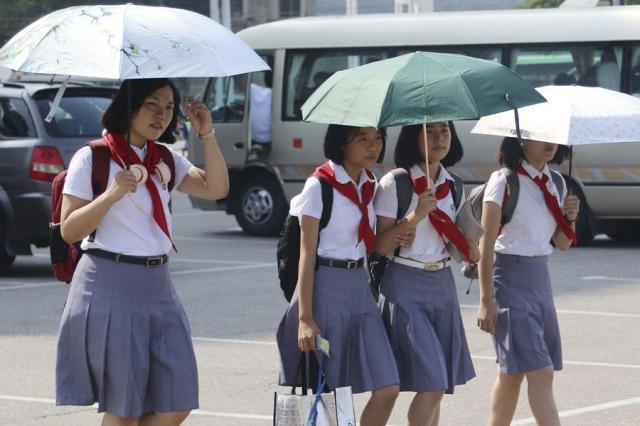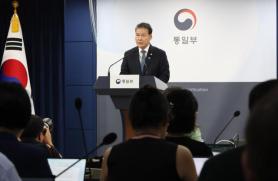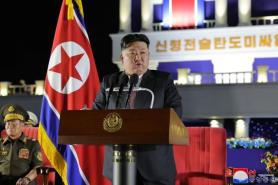
But the country's current president, Yoon Suk Yeol, proposed a new approach this year. Rather than emphasizing "peaceful reunification" with North Korea, as has been the focus of many previous presidents, Yoon's vision places "freedom" at the heart of South Korea's reunification pursuit.
In his speech, Yoon spelled out the tasks he sees as crucial for moving towards a unified Korea. Among them was the "need to change the minds of the North Korean people, to make them ardently desire a freedom-based reunification." Simply put, this will involve promoting the freedom of North Koreans to access information from the outside world.
This approach suggests the South Korean government will continue its hands-off policy towards the activists who have for months been sending balloons across the border filled with leaflets criticizing the regime of North Korea's leader, Kim Jong-un.
Yoon's government has refrained from intervening with the activities of these activists, who are mainly North Korean defectors. It has even cited a Constitutional Court ruling from 2023 that declared these actions protected under freedom of expression.
At the same time, Yoon's approach will involve preserving the values that make South Korea a "free" nation, and making these the guiding principles for a unified Korea. These include its liberal democracy, free-market economy, and respect for human rights.
So far, there has been no response to Yoon's announcement from the North. The North's silence is quite unusual, as Pyongyang almost always responds to Seoul's proposals for runification immediately – and negatively.
What South Korea wants
Seoul's aims are twofold. For one, it hopes that with plenty of access to outside information, more North Koreans may aspire to live in the South, increasing the number of defection attempts across the border.
The number of successful defections dropped significantly from 2020 after North Korea sealed its borders during the pandemic. But after border controls eased again in 2023, the annual number of defectors making it to the South almost tripled to 196. Recently, on August 20, Seoul's military announced it had picked up a North Korean soldier who had crossed the border – the second defection in two weeks.
Furthermore, Seoul envisions that an influx of information could lead to a popular uprising in the North. Such an uprising may pressure that regime to either bend and allow greater freedom and human rights to its people, or to break.
But, in my opinion, these scenarios are unlikely to turn into reality. After all, Pyongyang's tight control of outside information has so far enabled the regime to survive.
Seoul's new vision for reunification is provocative and may not be well received by Pyongyang. It may even put the lives of ordinary North Koreans at risk by encouraging Kim's regime to tighten its information control.
Yoon's commitment to developing a new vision for Korean reunification can be traced back several months. In March, South Korea's presidential office announced its intention to update the National Community Unification Formula, which since 1994 has been the government's official reunification policy.
The formula is comprised of three stages: seeking reconciliation and cooperation with the North, establishing a Korean commonwealth, then creating a single unified Korea.
While the exact nature of the update is not yet clear, the decision to revise the existing reunification formula is not a surprise. There has been no progress beyond the first stage since the formula was introduced three decades ago.
Seoul's decision to review and update its reunification formula also came after Kim reportedly abandoned hopes for reunification in January. In a speech delivered at North Korea's parliament, he said the constitution should be changed to designate the South as the "principal enemy."
Retaliation from the North
The primary goal of freedom-based reunification – giving ordinary North Koreans greater access to information from the outside world – is something to which Kim's regime is fervently opposed.
Information control has for decades been, and will continue to be, one of North Korea's top priorities. The increased consumption of foreign media in North Korea, especially of K-Pop music and K-Drama television shows, has already resulted in multiple public executions.
So, retaliation against Seoul's freedom-based reunification overtures should be expected. North Korea has already sent hundreds of balloons filled with excrement and trash into South Korea as a response to the leaflet launches. And in June, Kim's sister, Kim Yo-jong, warned of additional retaliatory measures if they continue, saying South Korea should be "ready to pay a gruesome and dear price."
From North Korea's point of view, any attempt at sending flyers containing outside information is a direct threat to the regime's stability.
Freedom of expression and access to information are important universal values that need to be protected at all times. But provoking Kim's regime may jeopardize lives by triggering a more repressive crackdown on people in North Korea.
It is for this reason that Seoul's push for freedom-based reunification could be a hard sell for the North Korean people.
-------------------------------------------------------------------------------------------------------------------------
Peter Han is a PhD Candidate in Asian and Middle Eastern Studies at the University of Cambridge.
This article was republished under a Creative Commons license with The Conversation. The views and opinions in this article are solely those of the author.
https://theconversation.com/why-north-korea-may-find-the-souths-new-vision-for-unification-provocative-236971
Copyright ⓒ Aju Press All rights reserved.



